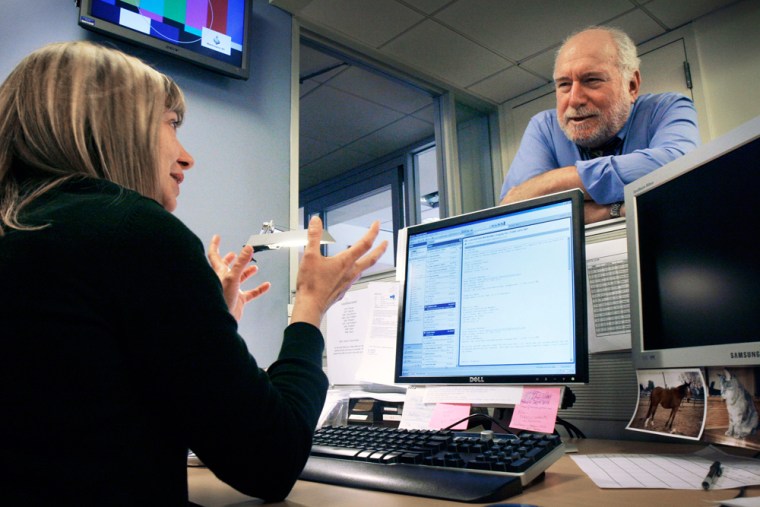Ten years after starting Arabic-language broadcasts that angered leaders in the region and Washington, Al-Jazeera on Wednesday launched an English-language news channel available in more than 80 million homes but lacking major U.S. distribution.
Al-Jazeera English went on the air at 8 a.m. ET, broadcasting from the station’s headquarters in Doha, capital of the tiny Persian Gulf state of Qatar.
A screen graphic with a clock ticking down the minutes gave way to a photo montage of the biggest news stories of the past decade and an announcer saying the new channel would be “setting the news agenda.”
“It’s Nov. 15th, a new era in television news,” its anchor said.
The channel quickly jumped to live feeds from correspondents in various regions — starting with the Gaza Strip in a spot that reflected the channel’s promise to focus on Arab concerns in the Middle East.
The station reported on a rocket attack by Palestinian militants that killed an Israeli woman — then cut to its Gaza correspondent reporting on the aftermath of Israel’s shelling of the Gaza town of Beit Hanoun that killed 18 Palestinians earlier this week.
The video showed pancaked apartment blocks and a scarred baby lying a hospital bed after being wounded in the Israeli attack. The correspondent did her standup in front of a destroyed home.
It was followed by a clip from an interview with Hamas leader Khaled Mashaal. Later, the Jerusalem correspondent reported on Israel’s growing anger over rocket attacks and fear among residents of towns near Gaza.
Broadcasting across continents
The station appeared eager to show its global reach, moving to live reports from correspondents in Sudan’s Darfur region, Iran, Zimbabwe and Brazil and breaking in with a report on a tsunami warning in Japan.
Al-Jazeera, which is bankrolled by Qatar’s royal family, said its signal would reach 80 million households with cable and satellite TV, mainly in the Middle East and Europe. It hopes to steal viewers from CNN and the British Broadcasting Corp. by giving the world’s 1 billion English speakers news from a non-Western perspective.
In London, BBC Global News Director Richard Sambrook said Al-Jazeera may take away some of his network’s viewers, but the new channel’s reach stands far below BBC World’s 270 million homes.
“They’ve made a very confident start, which isn’t surprising since they have a large budget and had a long time to prepare,” Sambrook said.
But Al-Jazeera’s Third World focus could backfire, Sambrook said.
“They clearly want to differentiate themselves from the BBC and CNN by representing developing countries,” he said. “It will take some time to see whether they can do that and still keep broad appeal. That may limit their audience.”
Al-Jazeera’s feisty Arabic news channel is well known for angering leaders in the West and the Arab world, where it has been banned from operating in 18 countries at various times. Four Arab nations still bar its reporters.
The station has broken new ground covering once-taboo political, religious and social subjects, while airing interviews with opposition figures and Israeli officials who previously were absent from other Arab networks.
Bush administration officials have branded the network’s airing of messages from Osama bin Laden as an incitement to terrorism and criticized its often graphic coverage of bloodshed in Iraq.
Al-Jazeera says the messages and images are newsworthy. It has promoted its broadcasts to U.S. officials as the ideal venue to address the Muslim world.
An anti-U.S. reputation
Still, the station is burdened with a reputation among Americans as anti-U.S. — an image Al-Jazeera insists is unfair. Its staffers argue that while the station has an Arab viewpoint, its coverage is balanced.
At least for now, most Americans will have no chance to see Al-Jazeera to judge for themselves. Al-Jazeera’s list of U.S. carriers included none of the major U.S. cable TV providers: Comcast, Time Warner Cable, Cox Communications, Charter Communications or Cablevision. Neither of the two major satellite TV providers in the U.S. — Dish Network and DirecTV — are carrying the network.
Some U.S. cable carriers are adopting a “show-me” policy, waiting to see what sort of reaction the station generates before agreeing to carry it, said Michael Holtzman, a spokesman for the network.
Al-Jazeera English will be available to American customers of GlobeCast, the subsidiary of a French company that offers satellite TV service.
The other companies Al-Jazeera English said it had agreements with are Fision, a digital service that will be available shortly in Houston; Jump TV, which describes itself as “the world’s leading broadcaster of ethnic TV over the Internet; and VDC, a service that offers TV on the Internet to about 10,000 customers in the U.S.
Coverage available online
The broadcast will also be streamed live on Al-Jazeera English’s Internet site.
Across Europe and the Middle East, Al-Jazeera English will be widely available on major cable providers in Britain, Germany, Italy and even Israel.
The launch was originally scheduled for early 2006 but was repeatedly postponed due to technical problems and licensing issues. Al-Jazeera executives said they are negotiating with carriers in the U.S., Asia and elsewhere to broadcast its signal.
Al-Jazeera English hired more than 500 staffers, poaching journalists from American and British networks, including former CNN anchor Riz Khan, the BBC’s David Frost and former ABC correspondent Dave Marash.
It will broadcast in high-definition TV, with its chief broadcast centers in Doha, London, Washington and Kuala Lumpur, Malaysia.
